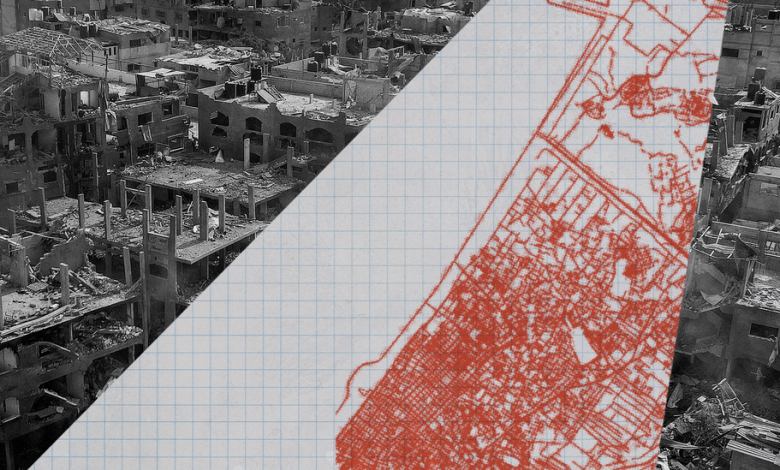I Saw What Happened to America’s Postwar Plans for Iraq. Here’s How Israel Should Plan for Gaza.

I headed postwar Iraq planning for the U.S. State Department in 2002 and 2003. Once the White House decided in 2002 to remove Saddam Hussein by force, I cautioned my superiors that there needed to be serious planning for what would follow. The study I led — the Future of Iraq Project, only some of which is now public — gave U.S. leaders an understanding of what postwar Iraq would need.
But before we could put plans into effect, we were thrown out of the Pentagon by Secretary of Defense Donald Rumsfeld at Vice President Dick Cheney’s orders in a dispute over what to do in Iraq. As a result, many of the American civilians who went there had little experience and even less knowledge of what Iraq needed to recover from decades of brutal and corrupt rule under Mr. Hussein and his Baath Party. The result contributed to the tragedy for Iraq, the United States and the entire Middle East.
What we’re seeing now in Israel and Gaza gives me the same grave concern so many of us felt 20 years ago: a lot of talk about military plans and the devastation of war and not enough about what will need to come after. I have not written publicly before about the lessons the United States should have learned from what happened to postwar plans for Iraq. With the humility of hard-won experience, I would like to offer those lessons as advice to whoever assumes this role in Israel today: the official in charge of developing a plan for a post-Hamas Gaza.
Your job will be hard, but it’s not hopeless. Reject the cynics’ advice that Israel’s job begins and ends when it defeats Hamas militarily and destroys its ability to harm Israelis again. If you fail to try to build something better in Hamas’s place or try in a halfhearted way, Israel will gain only a few years’ respite. Destruction is easy, but building is hard. That does not mean it is impossible.
The self-defeating mind-set that took hold in the United States not long after Iraq’s occupation was that the decision to invade Iraq was an original sin — something so wrong that it could never have come out better than it did. That mentality is damaging because it cuts off any serious effort to understand what went wrong and why.
The label of forever wars that has been firmly attached to America’s wars in Iraq and Afghanistan fails to acknowledge that poor planning and scant resources will always fail to secure postwar peace. It astounds me that anyone could be surprised by this. But the lessons of postwar Germany and Japan that led to their prosperous democracies today, including well-resourced physical and political reconstruction and the time to succeed, were utterly misunderstood and misapplied by Washington in 2003 and 2004. Israel has faced its own forever war since 1948. Poor planning and scant resources are also your enemy.
Just as Iraqis rightly told us before the 2003 invasion that Iraq is not Afghanistan, Gaza is neither Iraq nor Afghanistan. Factors unique to Gaza, such as decades of Hamas’s anti-Israeli and anti-Jewish propaganda and Israel’s treatment of Gazan civilians since 1967, will make both physical and political rebuilding especially challenging to Israel and even more challenging than southern Lebanon was to Israel from 1985 to 2000. The deep-seated hatred that many Gazans have for Israel today has no parallel to what U.S. forces faced entering Kabul or Baghdad. Anything Israel touches in a post-Hamas polity in Gaza risks becoming toxic; you must plan for this. Your plans need to understand what Gaza needs and to recognize that the government of Israel may not be the best means to deliver that.
Plan for the length of time you will need to bring about the fundamental changes that will break the cycle of violence Israel and Gaza have inflicted on each other over the past 50-plus years — not the time politicians think you will need. One reason the State Department’s best postwar plan for Iraq, which has still never been made public, was rejected by the White House was that Pentagon officials argued that a three-year timeline was too long. Decision makers opted for the siren song of one year or less and vastly inadequate physical or political reconstruction money, without regard for the reality that fast and cheap was doomed to fail. Instead, the United States expended more in blood and treasure from 2003 to 2011 and ended up strategically worse off than if a better postwar plan had been given the resources and time needed upfront. A repeat of Israel’s 15-year occupation of southern Lebanon is neither realistic nor desirable, but neither is the more recent pattern of quickground incursions followed by withdrawals, or what’s called mowing the grass.
Finally, remember that military victory is an asset whose power decreases over time. If and when Israel succeeds in defeating Hamas, use that limited time wisely. What you decide to prioritize may be all you get done, so it has to lay the groundwork for constructive steps, not chaos, to follow. Recovery from disastrous decisions at the outset — like the U.S. decisions to disband the Iraqi army and to fire tens of thousands more Baath Party members than necessary from their government jobs, thus largely creating the Sunni insurgency — is almost impossible.
So what should you prioritize at the outset? Consider these six points, however difficult some may seem before a ground war even starts:
1. End Hamas’s culture of economic corruption in Gaza. Corruption is at the heart of what Hamas uses to keep the Gazan people in line. This needs to end. You may have a chance to put in place once-in-a-generation root-and-branch reforms in public integrity in government contracting, civil service hiring and business practices in Gaza.
2. Listen to what Gaza’s residents want. Ordinary Gazans must have a say in their future.
3. Change the educational curriculum. This has been Hamas’s basis for ensuring enduring hatred of Israel. But don’t listen to the equally poisonous voices in Israel that would overplay your hand and undermine lasting educational reforms that would work for Gaza. There are many experts today in the Middle East and outside it who have constructive ideas for an educational curriculum that is true to Palestinian history and in the best interests of lasting coexistence.
4. Find a path for Gazans to write a constitution that will lead toward a more democratic state that can live in peace side by side with Israel. Israel needs to demonstrate that it is committed to a two-state solution. This is one way to do that.
5. Show Gazans that Israel is prepared to help Gaza rebuild economically. This close to Oct. 7, Israelis cannot readily conceive of committing to a Marshall Plan for Gaza. But Israel needs to think through what conditions would make this the right thing to do.
6. Border security for Gaza that Israel can live with — not a siege — is vital. The U.S. failure to plan for security along the Iran-Iraq border was one of the most egregious flaws in the entire U.S. postwar plan. Iran poured money, explosives and operatives into Iraq, undermining any hope for a more stable Iraqi government. It is obvious that the measures Israel has had in place since 2007 have not prevented Iran from funding, arming and helping train Hamas. Israel needs now to do better. Even when Israeli ground forces ultimately pull back from Gaza and Gazans start to provide their own police force, Israel will want to ensure for at least three decades, as unobtrusively as possible, that neither Iran nor anyone else has the ability to smuggle into Gaza the means of waging war. At the Department of Homeland Security, I helped draft this kind of plan for Israeli-Palestinian border security that could be retrieved from storage and updated — and to be made real.
As David Fromkin wrote in “A Peace to End All Peace,” it took Europe well over a thousand years to settle the fall of the Roman Empire. No one should be surprised that it is taking the Middle East more than a hundred years to settle the fall of the Ottoman Empire.
To the Israeli official looking back at history and ahead at what needs to get done: If Israel’s government does seek, as the prime minister’s official account on X (formerly Twitter) put it, “the destruction of the military and governing capabilities of Hamas and Islamic Jihad,” you must start today to lay the groundwork for a more durable peace. It will be hard, but it is not impossible.
“We have no choice,” Golda Meir said to an American TV audience in September 1973. “We do everything that is really impossible — and we remain alive.”
Thomas S. Warrick is a nonresident senior fellow with Middle East programs at the Atlantic Council and the director of the Atlantic Council’s Future of DHS Project. He served in the Department of State from 1997 to 2007 and was the Department of Homeland Security deputy assistant secretary for counterterrorism policy from 2008 to 2019.
Source photograph by Yahya Hassouna/Agence France-Presse, via Getty Images.
The Times is committed to publishing a diversity of letters to the editor. We’d like to hear what you think about this or any of our articles. Here are some tips. And here’s our email: [email protected].
Follow The New York Times Opinion section on Facebook, Twitter (@NYTopinion) and Instagram.




